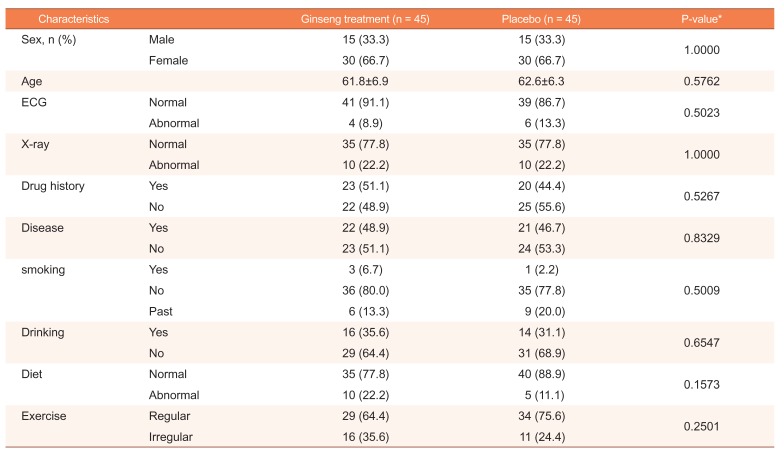1. Attele AS, Wu JA, Yuan CS. Ginseng pharmacology: multiple constituents and multiple actions. Biochem Pharmacol. 1999; 58:1685–1693. S0006-2952(99)00212-9. PMID:
10571242.
2. Kennedy DO, Scholey AB. Ginseng: potential for the enhancement of cognitive performance and mood. Pharmacol Biochem Behav. 2003; 75:687–700. S0091305703001266. PMID:
12895687.

3. Nitta H, Matsumoto K, Shimizu M, Ni XH, Watanabe H. Panax ginseng extract improves the scopolamine-induced disruption of 8-arm radial maze performance in rats. Biol Pharm Bull. 1995; 18:1439–1442. PMID:
8593452.

4. Zhao R, McDaniel WF. Ginseng improves strategic learning by normal and brain-damaged rats. Neuroreport. 1998; 9:1619–1624. PMID:
9631476.

5. Yang JH, Han SJ, Ryu JH, Jang IS, Kim DH. Ginsenoside Rh2 ameliorates scopolamine-induced learning deficit in mice. Biol Pharm Bull. 2009; 32:1710–1715. DOI:
10.1248/bpb/32.1710. PMID:
19801832.

6. Liu L, Hoang-Gia T, Wu H, Lee MR, Gu L, Wang C, et al. Ginsenoside Rb1 improves spatial learning and memory by regulation of cell genesis in the hippocampal subregions of rats. Brain Res. 2011; 1382:147–154. S0006-8993(11)00135-1. DOI:
10.1016/j.brainres.2011.01.051. PMID:
21276426.

7. Zhao H, Li Q, Pei X, Zhang Z, Yang R, Wang J, et al. Long-term ginsenoside administration prevents memory impairment in aged C57BL/6J mice by up-regulating the synaptic plasticity-related proteins in hippocampus. Behav Brain Res. 2009; 201:311–317. S0166-4328(09)00148-X. DOI:
10.1016/j.bbr.2009.03.002. PMID:
19428650.

8. Zhao H, Li Q, Zhang Z, Pei X, Wang J, Li Y. Long-term ginsenoside consumption prevents memory loss in aged SAMP8 mice by decreasing oxidative stress and up-regulating the plasticity-related proteins in hippocampus. Brain Res. 2009; 1256:111–122. S0006-8993(08)03007-2. DOI:
10.1016/j.brainres.2008.12.031. PMID:
19133247.

9. Wang Q, Sun LH, Jia W, Liu XM, Dang HX, Mai WL, et al. Comparison of ginsenosides Rg1 and Rb1 for their effects on improving scopolamine-induced learning and memory impairment in mice. Phytother Res. 2010; 24:1748–1754. DOI:
10.1002/ptr.3130. PMID:
20564503.

10. Zhang G, Liu A, Zhou Y, San X, Jin T, Jin Y. Panax ginseng ginsenoside-Rg2 protects memory impairment via anti-apoptosis in a rat model with vascular dementia. J Ethnopharmacol. 2008; 115:441–448. S0378-8741(07)00545-4. DOI:
10.1016/j.jep.2007.10.026. PMID:
18083315.

11. Zhang JT, Qu ZW, Liu Y, Deng HL. Preliminary study on antiamnestic mechanism of ginsenoside Rg1 and Rb1. Chin Med J (Engl). 1990; 103:932–938. PMID:
2177392.
12. Sala F, Mulet J, Choi S, Jung SY, Nah SY, Rhim H, et al. Effects of ginsenoside Rg2 on human neuronal nicotinic acetylcholine receptors. J Pharmacol Exp Ther. 2002; 301:1052–1059. PMID:
12023537.

13. Salim KN, McEwen BS, Chao HM. Ginsenoside Rb1 regulates ChAT, NGF and trkA mRNA expression in the rat brain. Brain Res Mol Brain Res. 1997; 47:177–182. PMID:
9221915.

14. Abe K, Cho SI, Kitagawa I, Nishiyama N, Saito H. Differential effects of ginsenoside Rb1 and malonylginsenoside Rb1 on long-term potentiation in the dentate gyrus of rats. Brain Res. 1994; 649:7–11. DOI:
10.1016/0006-8993(94)91042-1. PMID:
7953656.

15. Smriga M, Saito H, Nishiyama N. Hoelen (Poria Cocos Wolf) and ginseng (Panax Ginseng C. A. Meyer), the ingredients of a Chinese prescription DX-9386, individually promote hippocampal long-term potentiation in vivo. Biol Pharm Bull. 1995; 18:518–522. PMID:
7655419.
16. Rudakewich M, Ba F, Benishin CG. Neurotrophic and neuroprotective actions of ginsenosides Rb(1) and Rg(1). Planta Med. 2001; 67:533–537. DOI:
10.1055/s-2001-16488. PMID:
11509974.

17. Sanghavi CR, Barhate SA, Mahajan MS, Mohan M, Kasture SB. Korean ginseng extract attenuates reserpine-induced orofacial dyskinesia and improves cognitive dysfunction in rats. Nat Prod Res. 2010; 25:704–715. 924298402. DOI:
10.1080/14786410802583031. PMID:
20628966.

18. Lee ST, Chu K, Sim JY, Heo JH, Kim M. Panax ginseng enhances cognitive performance in Alzheimer disease. Alzheimer Dis Assoc Disord. 2008; 22:222–226. DOI:
10.1097/WAD.0b013e31816c92e6. PMID:
18580589.

19. Heo JH, Lee ST, Chu K, Oh MJ, Park HJ, Shim JY, et al. An open-label trial of Korean red ginseng as an adjuvant treatment for cognitive impairment in patients with Alzheimer's disease. Eur J Neurol. 2008; 15:865–868. ENE2157. DOI:
10.1111/j.1468-1331.2008.02157.x. PMID:
18684311.

20. Thommessen B, Laake K. No identifiable effect of ginseng (Gericomplex) as an adjuvant in the treatment of geriatric patients. Aging (Milano). 1996; 8:417–420. PMID:
9061129.

21. Lee MS, Yang EJ, Kim JI, Ernst E. Ginseng for cognitive function in Alzheimer's disease: a systematic review. J Alzheimers Dis. 2009; 18:339–344. P3R446843K3051H3. DOI:
10.3233/JAD-2009-1149. PMID:
19584437.

23. kang Y, Na DL. Seoul neuropsychological screening battery (SNSB). 1st edn. Incheon: Human Brain Research and Consulting Co.;2003.
24. Kennedy DO, Scholey AB, Wesnes KA. Modulation of cognition and mood following administration of single doses of Ginkgo biloba, ginseng, and a ginkgo/ginseng combination to healthy young adults. Physiol Behav. 2002; 75:739–751. S0031938402006650. PMID:
12020739.

25. Kennedy DO, Scholey AB, Wesnes KA. Differential, dose dependent changes in cognitive performance following acute administration of a Ginkgo biloba/Panax ginseng combination to healthy young volunteers. Nutr Neurosci. 2001; 4:399–412. PMID:
11842916.
26. Kennedy DO, Scholey AB, Wesnes KA. Dose dependent changes in cognitive performance and mood following acute administration of Ginseng to healthy young volunteers. Nutr Neurosci. 2001; 4:295–310. PMID:
11842896.








 PDF
PDF ePub
ePub Citation
Citation Print
Print




 XML Download
XML Download